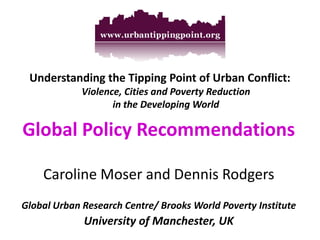
Understanding the Tipping Point of Urban Conflict: Global Policy Recommendations
- 1. Understanding the Tipping Point of Urban Conflict: Violence, Cities and Poverty Reduction in the Developing World Global Policy Recommendations Caroline Moser and Dennis Rodgers Global Urban Research Centre/ Brooks World Poverty Institute University of Manchester, UK
- 2. Comparative research insights UTP project not designed as conventional comparative investigation Each city study generated city-specific policy recommendations But a number of cross-cutting insights also emerged concerning: 1.Theoretical concepts; 2.Conventional wisdoms about urban violence; 3.Specific cross-cutting themes; and 4.Overarching policy recommendations.
- 3. Conceptual insights I: Tipping points Promoted an awareness of broader structural issues & of critical connections between macro and micro-level processes Ensured understanding of conflict and violence not as static events, but as processes, that need to be understood relationally Tipping points can be from conflict to violence AND/OR violence to conflict
- 4. Conceptual insights II: Violence chains Illustrated interconnectedness between different forms of violence (focusing on just one type of violence offers an incomplete picture of reality) Highlights importance of adopting a cross- sector approach Certain chains of violence are potentially more consequential than others
- 5. Challenging conventional wisdoms I: Political violence Political violence often less a result of exclusion but relates to the urban elite obtaining or maintaining power [DILI, NAIROBI] Or can be as a result of inclusion into a violent governance system [PATNA, SANTIAGO] City political systems need to be recognised as potentially part of the problem – need to promote more participatory and positively inclusive forms of governance
- 6. Challenging conventional wisdoms II: Poverty Poverty is a contextual rather than a causal factor in relation to conflict and violence [NAIROBI, PATNA] Moreover, violence does not only affect poor areas, but also high-income areas [SANTIAGO] Poverty can be linked to violence when the non-poor perceive the poor as a problem, and this leads to their sanctioning or taking direct violent action against the poor [PATNA, SANTIAGO] Poverty, like violence, is a systemic phenomenon
- 7. Challenging conventional wisdoms III: Youth No “natural” correlation between youth and urban violence Young men – especially those unemployed – become instrumentally involved in violence through manipulation by political parties [DILI, NAIROBI] Youth are therefore generally not a driving force behind urban violence, even if they are often primary actors
- 8. Challenging conventional wisdoms IV: Gender-based insecurity Emerged as a major concern in all four cities Gender-based violence has to be understood in relation to other forms of violence - interconnections between public and private spheres are important Relations governing male-female violence more complex than patriarchy; male-male violence in public sphere is also important and complex Need to mainstream interventions that recognise socio-spatial interconnection between gendered violence and other forms of violence
- 9. Cross-cutting thematic issues 3 issues emerged as key drivers of urban violence across the four cities: Space Land the nature of urban governance. Differences in how these issues manifested themselves in each city, but also remarkable similarities
- 10. Cross-cutting thematic issues I: Space Specificity of urban spaces needs to be taken into account Urban spatial configurations can increase likelihood of urban conflict tipping into violence [DILI, NAIROBI] Mainstreaming awareness of spatial manifestations into violence reduction – such as slum upgrading BUT certain forms can aggravate situations of urban violence [PATNA, SANTIAGO – state vs. market] Policy makers need to recognize that space is not just a technical but a political issue
- 11. Cross-cutting thematic issues II: Land Dysfunctional land tenure systems and land sub- markets closely associated with violence Clearly establish rights & obligations of owners and tenants with necessary documentation Reduce land sub-market gaps Interrelationship between land tenure, conflict and violence discussed in relation to rural but not urban Violence reduction needs specifically urban land tenure policy
- 12. Cross-cutting thematic issues III: Governance Highly complex because of multiple and competing forms of authority within city Exclusionary forms of urban governance creates city where particular social groups lose out Need to promote inclusive, participatory bottom-up integrative measures including social amenities Most existing city level responses to violence focused on increasing security instead of reducing violence, therefore failed to tackle root causes Directly tackle violence by interventions to break chains, reverse tipping points
- 13. Overarching recommendations I a) Mainstreaming conflict and violence into development debates and policy Violence is not a separate domain of intervention b)Recognising that urban violence is urban Specificity of urban space means that social, economic, and political processes are both intensified and their effects magnified Use Participatory Violence Appraisal to identify violence that goes beyond crime and rapidly diagnose and monitor spatially different violence chains
- 14. Overarching recommendations II c) Engaging with the Police Frequently overlooked development partner Need to engage collaboratively beyond narrow remit of criminal justice d)Experimenting with innovative ideas to prevent conflict tipping into violence Need a new generation of proposals Cities are ideal “laboratories” for experimenting with more holistic approaches
- 15. Overarching recommendations III e) Addressing the political economy that underpins conflict and violence Ultimately comes down to the question of power and its distribution in society Relates to determining the kind of society urban citizens and local communities want & how different groups feel they should live together Need to be both pragmatic and realistic in terms of possible scope of action
- 16. “Tipping Points are a reaffirmation of the potential for change and the power of intelligent action. Look at the world around you. It may seem like an immovable, implacable place. It is not. With the slightest push – in just the right place – it can be tipped.” (Malcom Gladwell, 2000: 259)
